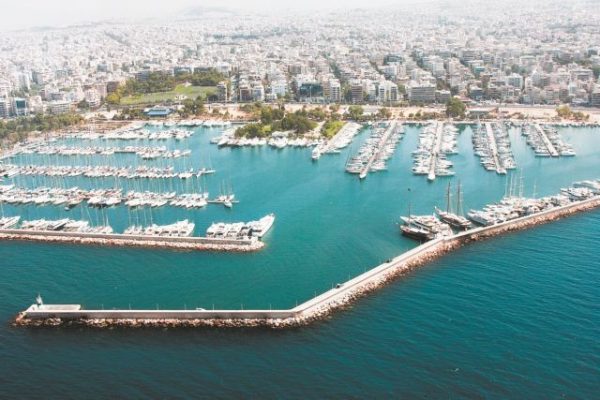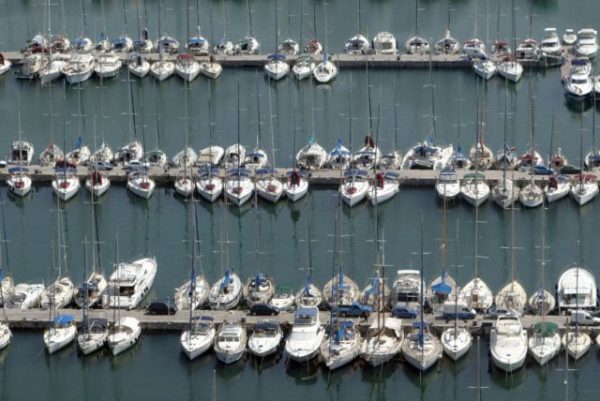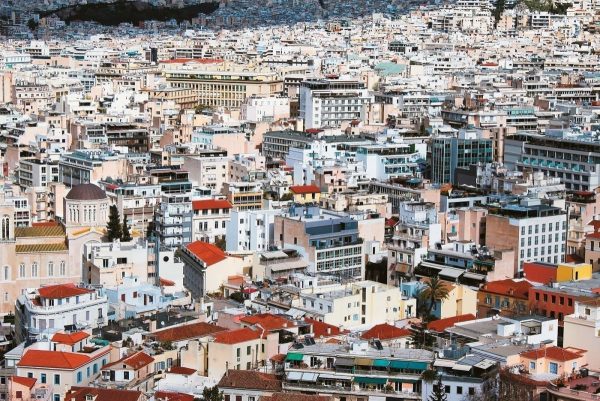
Up to 8,442 permanent jobs and 602.8 million euros per year will be contributed by the country’s tourist ports, according to the best-case scenario, as part of a new strategic management plan and improvement of the structure, management, and operation of the country’s tourist ports. .
The above conclusions are included in the new research prepared by diANEOsis in collaboration with the General Secretariat for Tourism Policy & Development of the Ministry of Tourism, which will be published in the fall of 2021, with the contribution of George K. Vangelas, Associate Professor of Business Administration and Shipping Management and Transport of the Department of Shipping and Business Services at the University of the Aegean and Thanos A. Pallis, Professor of Port Management and Shipping of the Department of Port and Shipping Management at the National and Kapodistrian University of Athens.
Greece is a very popular destination
In their article, in which they announce the research, the two professors point out, among other things, that maritime tourism is an economic activity with a significant contribution to employment and the national economy.
Greece is a very popular destination. With a coastline of 13,700 km and remarkable tourist potential, a significant fleet of yachts – including a significant number of mega-yachts (boats longer than 24 meters) -, short distances between destinations, rich cultural and historical potential and a natural environment of intrinsic beauty, the country potentially combines what the owner / user of professional yachts seeks.
Actions in 4 pillars
The new study by diANEOsis, which will be published in the near future, aims to submit a new strategic plan aimed at developing the network of tourist port infrastructure and services for the benefit of the national economy.
Through the formulation of this new strategic plan, a series of actions in 4 pillars of reform are proposed, which are estimated to contribute to the more efficient organization and management of marinas, but also to increase revenues and jobs in the industry.
How these ports operate today
The research, among other things, highlights a real problem in creating an attractive network in the country: most of the facilities have been demarcated but have not yet progressed to the construction stage. In addition, a number of tourist ports have been built but are not operational. Only 37 of the 168 specified tourist ports are in operation, that is 22%. Of the 27,512 yacht berths, only 30.9% are available today, or a total of 8,499 berths.
The type of tourist ports in operation is an indication of investment priorities. Of the total of 62 located marinas that have been built, 23 are operating, a percentage of 37.1%. Out of the 12 located private tourist port facilities, nine (9) operate, a percentage of 75%. Out of the 72 located shelters, only five (5) operate, a percentage of 6.9%. Of the 22 located moorings, none is operational to date (0%).
In terms of management and operation of tourist port facilities, the vast majority of located berths are almost evenly distributed between private management and operation, which are responsible for 44.5% of the tourist ports in tGreece, and Municipal and Inter-Municipal Port Funds (45.8% of the tourist ports of the territory). 5.7% of the total number of tourist port facilities are managed by Port Organizations SA. and 3.1% of the institutions operate as Port Funds.
Analyzing the governance framework of tourist ports, the study highlights (a) the plethora of management and operation of tourist port facilities, (b) the presence in the ownership of tourist ports of a significant number of state authorities and (c) the indirect or direct supervision of tourist ports, or part of their activities, by more than one ministry, resulting in complex and time-consuming bureaucratic procedures, which create difficulties in both the smooth development and the efficient operation of the system.
Holistic strategic approach
Aiming to increase the competitiveness of tourist ports, as well as to enhance their attractiveness for private investment, the study favors the formation of a holistic strategic approach.
The proposed strategic management plan provides the basis for a national strategic plan for tourist ports. This project should inspire to motivate the whole industry in initiatives that serve it. It is also important to connect with a specific vision – and to send a message – about the characteristics of the tourist port infrastructure that we as a country want to achieve. The proposed strategic management plan consists of four (4) pillars, with each pillar including specific, targeted, actions.
The pillars are related to infrastructure and network configuration, investment, administration and digitization. Each of the proposed strategies specializes in policy measures.
In the context of the proposed policies, two initiatives are considered the most important:
1. The evaluation of the network of already set out tourist port facilities. The evaluation policy can lead to the formation of a network of tourist ports that will be accessible, free from cases of ports that stagnate creating obstacles to the design and implementation of a competitive network. By selecting the appropriate cases of tourist ports that can be completed in construction, the evaluation of the already located tourist port facilities, with the formulation of final proposals, can directly contribute to the finalization of a network with more adequate spatial coverage and density.
2. The reform of the tender process for the concession of tourist ports, as today there is a heterogeneity of tender procedures resulting in a negative impact on the intentions of potential investors and, consequently, hindering healthy competition in the industry. To this end, the adoption of a specific policy is proposed, using and utilizing positive practices from abroad (Italy), to formulate a single concessions process with specific objectives.
The evaluation of the network of tourist ports of the country is connected with the Special Framework for Spatial Planning and Sustainable Development for Tourism, but also with the Regional Frameworks for Spatial Planning. The Special Framework for Spatial Planning and Sustainable Development for Tourism has been canceled by the Council of State. As a result, the location of tourist facilities in Greece is linked to the current Regional Spatial Planning Plans, which has recently been formed.
As can be seen in the presentation-overview, the Regional Frameworks are evaluated positively as they provide rational directions for the development of tourist ports per region of the country. In conclusion, (a) initiatives are needed to speed up the process of finalizing an integrated national Special Spatial Framework for Tourism, while (b) in the meantime the cooperation of the competent ministries – and in particular the Ministry of Tourism – is deemed expedient, necessary and beneficial. the local self-government of A ‘and B’ degree, in order to evaluate and further utilize the proposals for the development of tourist port facilities which include the individual Regional Spatial Planning Plans.
In the proposed development policies of the tourist ports sector, the role of the Ministry of Tourism is, of course, crucial, while the important role of the Public Private Property Utilization Fund (HRDF) should be emphasized in terms of formulating initiatives to find investors. and the implementation of policies for tourist ports. 
What will Greece gain from the reform – 3 Scenarios
The proposed management strategy plan for the improvement of the structure, management, and operation of the country’s tourist ports is able to form an adequate network of tourist ports with improved performance, which will be attractive to both the user and potential investors. Under these conditions, additional economic benefits are expected to be generated locally and nationally.
The study formulates alternative scenarios based on the implementation of the proposed strategic management plan and the new berths that could be created, taking into account the existing network of located tourist ports. Using data from recent economic impact studies of the market of tourist ports and yachts, the study proceeds to assess the impact of each scenario in both financial terms and terms of employment.
Scenario 1 – (Pessimistic scenario): Refers to the case where the proposed strategic plan for the management of tourist ports is not implemented and the comprehensive initiative to increase the number of tourist boat berths that is missing. In this case, no substantial change is expected in the extent of the sector’s contribution to the national economy and employment.
Scenario 2 – (Optimistic scenario): This is the case where the proposed strategic management plan is implemented in part and not in its entirety. Nevertheless, it creates the conditions for the construction of 15% of the total of the already located mooring positions in the period 2022-2031. It is estimated that in this scenario and for the whole decade 2022-2031 will create a positive cumulative financial impact of € 1,579 million. From the year 2031 onwards the optimistic scenario will create a total annual financial impact (direct and indirect) € 332.9 million while it will maintain about 4,652 direct jobs.
Scenario 3 – (Best Scenario): The proposed strategic management plan is implemented for the most part, creating conditions for restarting the industry, increasing its competitiveness and attracting private capital. A total of 30% of the existing site and non-constructed mooring sites are constructed and operated. In the total period under review (2022-2031) the 5,164 new berths will create a cumulative financial contribution of € 2,862 million. From 2031 onwards, the new berths will contribute financially (direct and indirect impact) with € 602.7 million while they will maintain 8,422 jobs on an annual basis.
Latest News

Trump Tariffs Jeopardize Growth: Piraeus Chamber of Commerce
The tariffs, aimed at reducing the U.S. trade deficit, are expected to have both direct and indirect effects on the European economy

EU Condemns Trump Tariffs, Prepares to Retaliate
As tensions escalate, the EU is expected to continue negotiations with Washington while preparing for potential economic retaliation.

The Likely Impact of Trump Tariffs on Europe and Greece
Trump tariffs are expected to negatively affect economic growth in the Eurozone while Greece's exports could take a hit.

Motor Oil Results for 2024: Adjusted EBITDA of 995 mln€; Proposed Dividend of 1.4€ Per Share
Adjusted EBITDA for 2024 was down 33% yoy. The adjusted profit after tax for 2024 stood at 504 million euros, a 43% decrease from the previous year

Cost of Living: Why Greece’s 3% Inflation Is Raising Alarm
Greece appears to be in a more difficult position when it comes to price hikes, just as we enter the era of Trump’s tariffs.

Fitch Ratings Upgrades the Four Greek Systemic Banks
NBG’s upgrade reflects the bank’s ongoing improvements in its credit profile, Fitch notes in its report, including strong profitability, a reduction in non-performing exposures (NPEs), and lower credit losses

Trump to Announce Sweeping New Tariffs Wednesday, Global Retaliation Expected
With Trump's announcement just hours away, markets, businesses, and foreign governments are bracing for the fallout of one of the most aggressive shifts in U.S. trade policy in decades.

Inflation in Greece at 3.1% in March, Eurostat Reports
Average inflation in the eurozone settled at 2.2%, compared to 2.3% in February

Greece’s Unemployment Rate Drops to 8.6% in February
Despite the overall decline, unemployment remains higher among women and young people.

Jerry Kalogiratos Highlights Key Role of Energy Transition and Data Demand in LNG Outlook
Energy transition and the prospects of LNG were discussed at Capital Link’s 19th Annual International Maritime Forum, during a panel discussion with Jerry Kalogiratos (Capital Clean Energy Carriers Corp.)

























![ΕΛΣΤΑΤ: Αυξήθηκε η οικοδομική δραστηριότητα κατά 15,6% το Δεκέμβριο [πίνακες]](https://www.ot.gr/wp-content/uploads/2025/03/DSC9655-2-1024x569-1-90x90.jpg)




![Τραμπ: ΕΚΤ και FED αναζητούν Πυθία για τα επιτόκια μετά τους δασμούς [γράφημα]](https://www.ot.gr/wp-content/uploads/2025/04/ot_trump_tariffs225-600x352.png)











 Αριθμός Πιστοποίησης
Αριθμός Πιστοποίησης